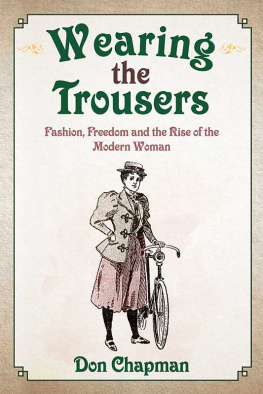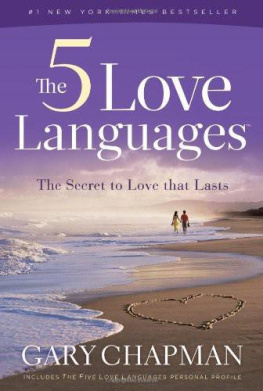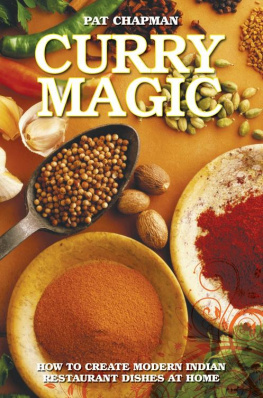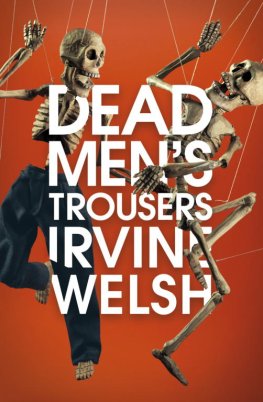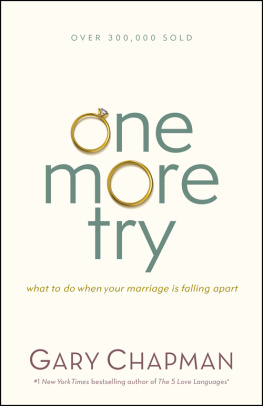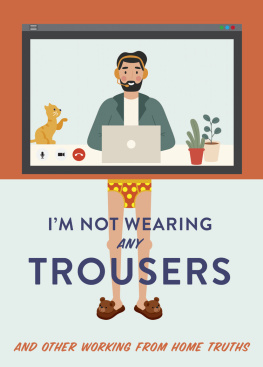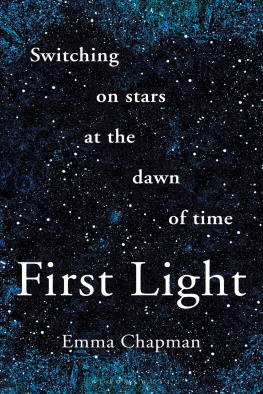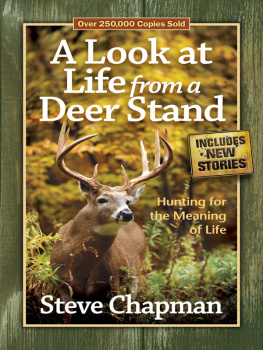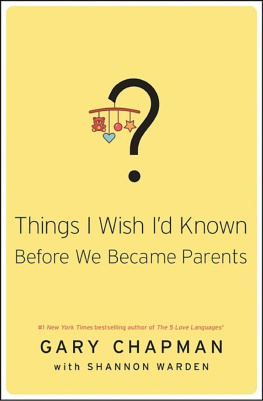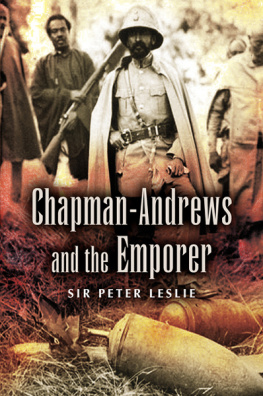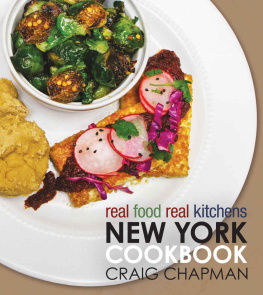Chapman - Wearing the Trousers
Here you can read online Chapman - Wearing the Trousers full text of the book (entire story) in english for free. Download pdf and epub, get meaning, cover and reviews about this ebook. year: 2017, publisher: Amberley Publishing, genre: Non-fiction. Description of the work, (preface) as well as reviews are available. Best literature library LitArk.com created for fans of good reading and offers a wide selection of genres:
Romance novel
Science fiction
Adventure
Detective
Science
History
Home and family
Prose
Art
Politics
Computer
Non-fiction
Religion
Business
Children
Humor
Choose a favorite category and find really read worthwhile books. Enjoy immersion in the world of imagination, feel the emotions of the characters or learn something new for yourself, make an fascinating discovery.
- Book:Wearing the Trousers
- Author:
- Publisher:Amberley Publishing
- Genre:
- Year:2017
- Rating:5 / 5
- Favourites:Add to favourites
- Your mark:
- 100
- 1
- 2
- 3
- 4
- 5
Wearing the Trousers: summary, description and annotation
We offer to read an annotation, description, summary or preface (depends on what the author of the book "Wearing the Trousers" wrote himself). If you haven't found the necessary information about the book — write in the comments, we will try to find it.
Chapman: author's other books
Who wrote Wearing the Trousers? Find out the surname, the name of the author of the book and a list of all author's works by series.
Wearing the Trousers — read online for free the complete book (whole text) full work
Below is the text of the book, divided by pages. System saving the place of the last page read, allows you to conveniently read the book "Wearing the Trousers" online for free, without having to search again every time where you left off. Put a bookmark, and you can go to the page where you finished reading at any time.
Font size:
Interval:
Bookmark:


In memory of Peter Buckman
First published 2017
Amberley Publishing
The Hill, Stroud
Gloucestershire, GL5 4EP
www.amberley-books.com
Copyright Don Chapman, 2017
The right of Don Chapman to be identified as the Author
of this work has been asserted in accordance with the
Copyrights, Designs and Patents Act 1988.
All rights reserved. No part of this book may be reprinted
or reproduced or utilised in any form or by any electronic,
mechanical or other means, now known or hereafter invented,
including photocopying and recording, or in any information
storage or retrieval system, without the permission in writing
from the Publishers.
British Library Cataloguing in Publication Data.
A catalogue record for this book is available from the British Library.
ISBN 9781445669502 (HARDBACK)
ISBN 9781445669519 (eBOOK)
Typeset in 10.5pt on 13pt Sabon.
Typesetting and Origination by Amberley Publishing.
Printed in the UK.
From the earliest times civilized women have been robed, not knicker-bockered. Men have grown up to know, love and esteem women in skirts. There are few men, we think, who would like to see their mothers or sisters without a skirt though they might not feel the same compunction in regard to some other fellows sister, provided she was young, good-looking and of a good figure A woman in wings would be less incongruous than an angel in knickers.
Oxford Times 11 September 1897
Any time I hear a man say he prefers a woman in a skirt, I say: Try one. Try a skirt!
Katharine Hepburn, film star (19072003)
I dont wear womens clothes Are women transvestites because they wear trousers? No. So I deny Im wearing womens clothes. I just say Im wearing clothes.
Eddie Izzard, comedian, talking to Decca Aitkenhead, Guardian 14 December 2013
My grateful thanks to Dr David Rubinstein for having the foresight to photocopy the Buckman Archive, without which this book would have been impossible; Amberley Publishings commissioning editor Aaron Meek, who shared my enthusiasm for exploring the quest for womens rights through the prism of womens dress; general history editor Cathy Stagg, who nursed my manuscript into print; my wife, Sue, who as ever was a wonderful help-mate and sourced several images; our friend and fellow Eynsham resident Paul Hughes, who enhanced many faded nineteenth-century images for the digital age; Simon P. Wilson, the Hull University Archivist and his staff at Hull History Centre who guided us through the Buckman Archive and introduced us to the delights of the 2017 UK City of Culture; the Nottingham historian Rowena Edlin-White for her help with Caroline Dexter; the former publicity officer of the Northumberland and Durham Family History Society, Pat Pierpoint, for her help with Lady Harberton; Professor Ian Leader-Elliott for his help with Mrs Eliza King; Professor Hugh Torrens for his help with Sydney Savory Buckman and valuable additions to the Buckman Archive; Dr Philip Bull for his help with Edward Richards; and others too numerous to mention who all hopefully are acknowledged in the notes and captions.
Many libraries and other institutions gave me the benefit of their expertise: Oxford Universitys Bodleian, Radcliffe Science and Rhodes House Libraries; Cambridge Universitys Newnham, Pembroke and Trinity College Libraries; Oxfordshire County Libraries; the British Library; the London School of Economics Library, which houses the Womens Library; the Victoria and Albert Museum; the National Library of Australia; the State Library of Victoria; the Centre for Buckinghamshire Studies; Gloucestershire Archives; Nottinghamshire Archives; Oxfordshire History Centre; Faith Renger and Malvern Museum; the Vegetarian Societys Enquiries and Advocacy Officer Susan Furmage; the Tony Allen Collection www.worldwar1postcards.com, Patricia Burstall; Andrew Catess John Leech Archive; Les Bowerman; Professor Pamela Howard and the Selsey Press.
On 5 September 1897, a wet and windy Sunday morning, four cyclists set out to ride from Oxford to Cheltenham. The best part of an hour later they passed through Eynsham, the west Oxfordshire village where I have lived since 1969. I like to think the more radically minded residents who were not in church gave them a cheer. Then, as now, the village had its liberal spirits. The more conservative may have averted their gaze. Any urchins about would have run after them catcalling and jeering. The three women bicyclists, the brazen hussies, were wearing knickers!
Knickers has become a pejorative term for ladies underwear, an expression used by schoolgirls who would never dream of swearing to give vent to their frustration. My colleagues on the weekly newspaper where I began my career in journalism in 1956 liked to cite the slogan Vickers for Knickers, which until recently had adorned the ears the advertisements either side of the mast-head of the Keighley News as proof of the West Yorkshire woollen towns lack of breeding. In fact, had the newspaper existed and Mr Vickers been advertising in it when the Bront sisters walked in from nearby Haworth to buy writing paper they would not have been at all embarrassed. Knickers, short for knickerbockers, was a perfectly respectable word to describe male and female nether garments. Even The Times used it. It was the bloomer furore of 1851 when enlightened women in the western world took to Turkish trousers for ease of mobility that led male chauvinists to coin a litany of expressions from indescribables to unmentionables. It was the Rational Dress campaign for divided skirts of the 1880s and 1890s that reignited their resentment. Rational was the Victorian buzzword for anything right-thinking people should adopt.
I first became interested in the subject in 1971 during the hot-pants craze, a passing feminine passion for wearing crushed velvet or satin shorts of the briefest dimensions. One of my readers, Peter Buckman, had been going through the papers of his grandfather, the Victorian geologist Sydney Savory Buckman, when he came across a surprise cache of documents and press cuttings relating to his grandparents involvement in the Cheltenham-based Western Rational Dress Club. It made three articles for the Anthony Wood Column, the daily feature I wrote for the Oxford Mail, principally because in 1897 Sydney and his wife, Maude Buckman, played leading roles in a historic cycle ride from London to Oxford. It was on their way home that they passed through Eynsham with his two sisters. I told Peter Buckman the subject deserved a book and when I retired I would write it. Because I had been the Oxford Mails theatre critic since 1959, when I did retire in 1994, the directors of the Oxford Playhouse invited me to write its history. As all the archives relating to that theatres first 33 years had disappeared, that took far longer than I thought. So it was only in 2010, after seeing that book into print and surviving the upheaval of downsizing, I was able to set about fulfilling my promise.
Before Peter Buckman died of cancer on 1 May 1990, I discovered he had approached several institutions in hopes of finding a permanent home for his grandparents material. I followed in his footsteps from the Geological Society of London to the Gallery of Costume at Manchester, where the trail ran cold. It seemed another invaluable archive had vanished. Happily, this time, all was not lost. During his travels Mr Buckman visited Hull University, where Dr David Rubinstein, then Senior Lecturer in Social History, had the presence of mind to photocopy the collection, and it is those copies that provided the starting point for this book. I am also indebted to Hugh Torrens, emeritus professor of Keele University. In the course of compiling a biographical paper on Sydney Buckman he rescued from relatives invaluable material, which was never part of, or had become detached from, the main collection. That explains my references to the Buckman Archive and Torrens Buckman Archive. Sadly I have not succeeded in tracing more than the first sixteen issues of the
Font size:
Interval:
Bookmark:
Similar books «Wearing the Trousers»
Look at similar books to Wearing the Trousers. We have selected literature similar in name and meaning in the hope of providing readers with more options to find new, interesting, not yet read works.
Discussion, reviews of the book Wearing the Trousers and just readers' own opinions. Leave your comments, write what you think about the work, its meaning or the main characters. Specify what exactly you liked and what you didn't like, and why you think so.

